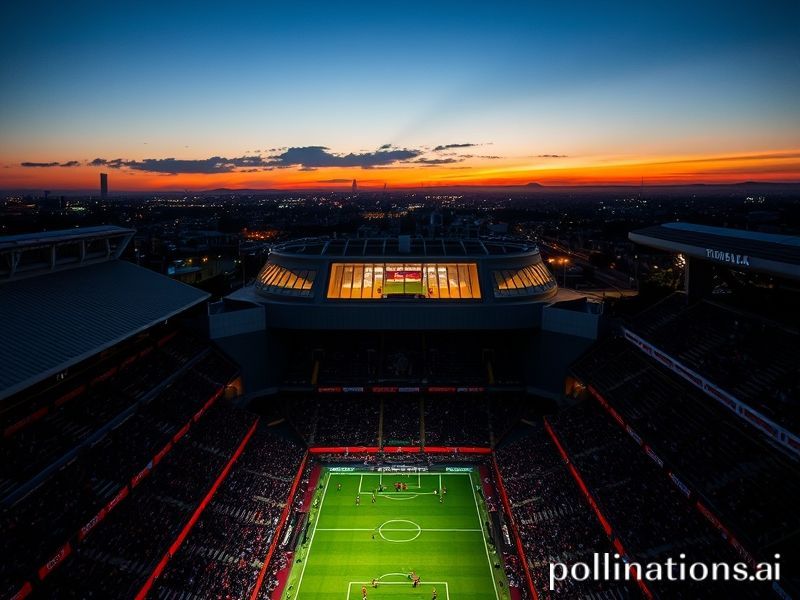Tijuana–León: The Hyphenated Fault Line Where Globalization Gets Assembled—and Smuggled Out for Lunch
TIJUANA—LEÓN: A BORDERLINE ROMANCE THE WORLD WATCHES WHILE PRETENDING NOT TO
From thirty thousand feet, the 1,300-kilometer ribbon between Tijuana and León looks like a careless doodle on a bar napkin. Down on the ground, however, it is the planet’s most honest résumé: smugglers, factory foremen, avocado moguls, and TikTok-famous taqueros all scribbling marginalia on the same sheet. The flight—AeroMexico 197, if you’re the punctual type—lasts two hours and ten minutes, roughly the time it takes a Belgian customs officer to decide whether a Mexican Hass is a fruit or a geopolitical statement.
To the rest of the world, Tijuana and León form a hyphenated afterthought in NAFTA’s family photo. To supply-chain managers in Düsseldorf, that hyphen is more sacred than the Rhine. Every day, German car seats—stitched by Guanajuato hands earning one-fifth of Wolfsburg wages—are hustled north to Baja assembly plants, then re-exported duty-free to Ohio dealerships, where buyers complain about “soft Mexican leather.” It’s globalization’s version of a trust fall, except nobody’s catching anyone; they’re just updating spreadsheets.
The corridor also moonlights as the West’s favorite morality play. Washington frets about fentanyl sluicing north; León’s narco-couture boutiques shrug and restock on Chinese precursor chemicals. Meanwhile, European NGOs tweet furiously about avocado deforestation, blissfully unaware that their Sunday brunch toast is 60 percent cartel-laundered. Everyone’s complicit, nobody’s responsible—the UN’s preferred division of labor.
Japan, ever the polite observer, chips in with industrial-strength irony. Toyota recently moved a Prius parts plant from Shizuoka to Silao, just outside León, citing “environmental synergies.” Translation: Mexican electricity is cheaper and nobody minds if you quietly dump solvents into the Lerma River. The resulting hybrids are shipped back to Yokohama, where commuters pat themselves on the back for saving the planet. The circle of life, sponsored by cognitive dissonance.
South Korea watches with the weary eyes of an older sibling. Samsung built a television-panel factory in Tijuana back when Juárez was still the Wild West. Today, K-dramas are dubbed into Spanish by Tijuanense voice actors who moonlight as coyote guides, because art imitates rent. Seoul’s trade ministry calls it “vertical integration.” Everyone else calls it Tuesday.
The human ledger is less poetic. León’s shoe industry—once the pride of Zapata’s home state—now competes with Vietnamese sweatshops whose workers make even less, a race to the bottom so steep it needs guardrails. Tijuana’s call-center reps soothe irate Californians about their credit-card bills while sharing cubicles with cousins who crossed the same border on foot last spring. HR calls it “multicultural synergy.” The cousins call it survival.
And yet, the corridor keeps inventing new plot twists. Last month, a León-based startup began 3-D-printing aerospace components from recycled avocado pits, winning a contract with Airbus. The EU heralded it as circular-economy genius; locals joke the pits still carry trace amounts of Michoacán gunpowder. Somewhere in Silicon Valley, a venture capitalist is already drafting a Medium post titled “Avocado-to-Orbit: How LatAm Innovation Will Disrupt Space.” He’ll forget to spell León correctly.
Come evening, the red-eye back south is a flying United Nations of exhaustion: Korean engineers clutching bottles of Tijuana craft beer, Mexican agronomists scrolling Frankfurt stock prices, a lone German auditor humming narcocorridos he Shazamed at the factory gate. Seat-back screens offer a documentary on sustainable leather. Nobody watches; they’ve lived the director’s cut.
When the wheels kiss the tarmac at Bajío International, the pilot’s welcome is drowned out by WhatsApp pings from every continent. Somewhere between the duty-free tequila and the immigration kiosk, the hyphen reasserts itself: not a border, not a brand, but the world’s most efficient confessional booth. We all fly through it eventually, carrying contraband of one sort or another—regret, lithium, hope, laundered cash—pretending the baggage carousel is the end of the journey. It never is.
Welcome to Tijuana–León, where the future gets assembled, repackaged, and resold to the past. Buckle up; turbulence is complimentary.







